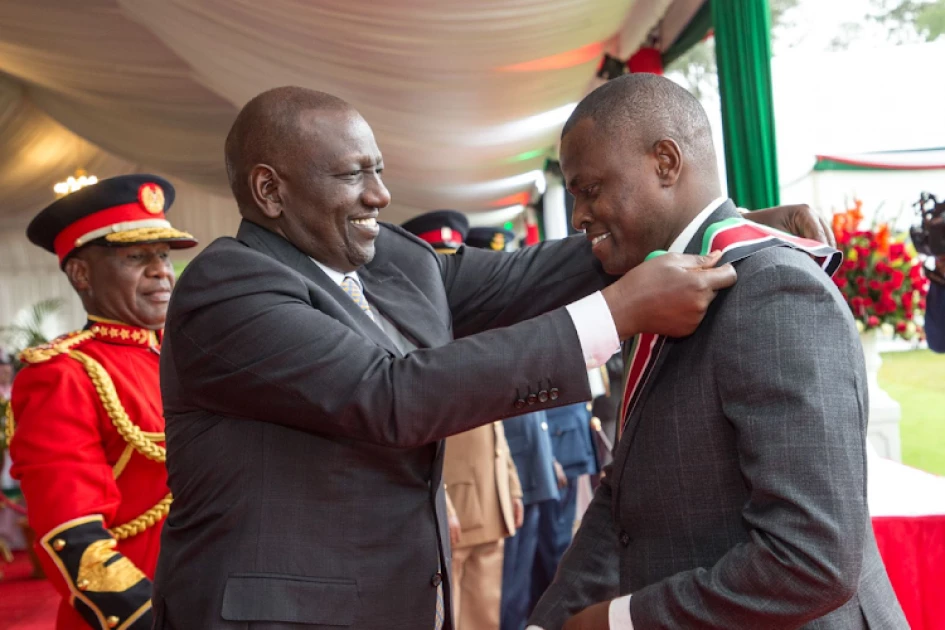How UDA threw Russia-Ukraine war out - then into - Kenya’s cost-of-living debate

President William Ruto awards Kiharu MP Ndindi Nyoro with the State commendation of the Chief of the Order of the Burning Spear (CBS) at State House on December 12, 2022

Audio By Vocalize
On
May 1, 2022, during Labour Day celebrations at Uhuru Gardens in Nairobi, then
President Uhuru Kenyatta attributed the high cost of living to the
Russia-Ukraine conflict that led to Russia’s invasion of Ukraine in February
2022.
He asked politicians, including his then deputy, William Ruto to stop blaming him for Kenya’s biting economic times.
“There is this war we don’t even understand that has caused fuel and food prices to go up in other countries and brought us other challenges… I, Uhuru Kenyatta, surely, am I in Ukraine? Was I in Wuhan when Covid came?" quipped Mr Kenyatta.
Accusing
Ruto of deserting him and resorting to inciting Kenyans for sympathy, Kenyatta
said the economic crisis had also been occasioned by the Covid-19 pandemic and
that it was beyond his control.
Ruto
was the United Democratic Alliance (UDA) party presidential candidate at the time, in a heated presidential campaign to succeed
Kenyatta, who had refused to endorse him as his preferred successor and instead
threw his weight behind former Prime Minister Raila Odinga.
A
month prior, Kenyatta had also blamed domestic fuel shortages and high fuel
prices on the Russia-Ukraine war, saying Kenya was experiencing ripple effects
of the conflict.
And
then, on June 30, Ruto shot down his boss’s remarks as a “lost cause”, adding that the answer to the high cost
of living is investing in agriculture and doubling farm produce.
“This whole story about Ukraine is a lost cause,” the then DP said, “...the challenge of cost of living
is not too scientific. The challenge of the cost of living is increasing
agricultural productivity, period.”
He vowed to support farmers with
fertiliser and seed subsidies “and ensure that post-harvest challenges are
managed,” to boost agricultural production and combat the cost-of-living
crisis.
During
a debate on the contentious Finance Bill, 2023, hosted by Royal Media Services
on Wednesday, the Russia-Ukraine war came into the conversation again, when Ndindi
Nyoro, chair of the National Assembly Budget and Appropriations Committee, said
it has led to supply chain disruptions which have in turn affected local prices
of commodities.
“There have been supply chain cuts globally after the Russia-Ukraine war… it has had a big effect and also in terms of prices,” Nyoro said.
Pressed further on his admission against Kenya Kwanza’s stance during the campaign, Nyoro said “What I have stated is a fact.”
"Isn't
it an irony that it was not the position that your campaign team held in the
months leading up to the elections? In fact, the president, who was then the UDA
presidential candidate, stated that the government should not blame the
economic crisis in Kenya on the Russia-Ukraine war, yet the Budget Committee chairperson
and UDA MP sits here and states that the war has had an impact on Kenya’s economy.
Why the double standards?" Citizen TV’s Ayub Abdikadir posed.
What
matters, the Kiharu MP argued, is how Kenyatta’s Jubilee administration and the
current regime have dealt with it.
“What
we should distinguish is what they were doing then and what we are doing now. What
they did then was try and subsidise the consumption, while we are incentivising
production.”
Kenya
imports wheat, oil, iron, steel, and fertilizers from Russia and Ukraine, while
the two Eastern European and Northern Asian countries dominate wheat imports to
the East African region.
After
the invasion, disruption in fertilizer production and exportation caused a
spike in the price of fertilizer in Kenya, making the government introduce a
fertilizer subsidy programme.
Similarly,
sanctions against Russia after the invasion disrupted the oil supply in the
world, leading to costly oil products in Kenya, and thus an increased cost of
living.
Ironically, despite his public comments on the campaign trail, Ruto’s
Kenya Kwanza manifesto actually cited the conflict as one of the things to
blame for Kenya’s economic woes.
The document began by painting a picture of the ‘perfect storm’
Kenya was in, reading: “We are presently confronted by three challenges that
have converged into the perfect economic storm. The first is an external shock
of rising inflation and interest rates, occasioned by Covid-19 related global
supply chain bottlenecks, the economic stimulus spending in the major
economies, and the Ukraine war.”


Leave a Comment